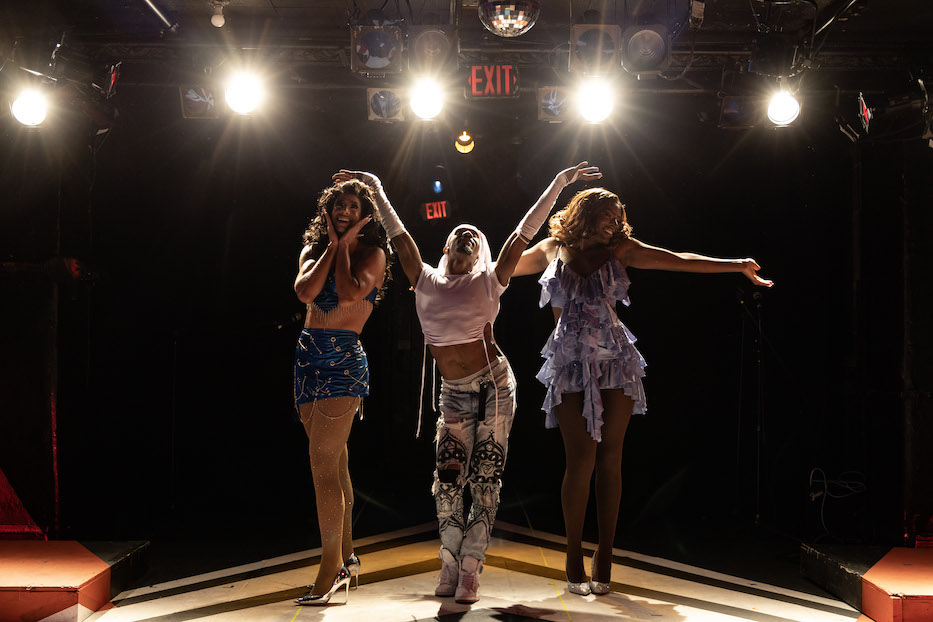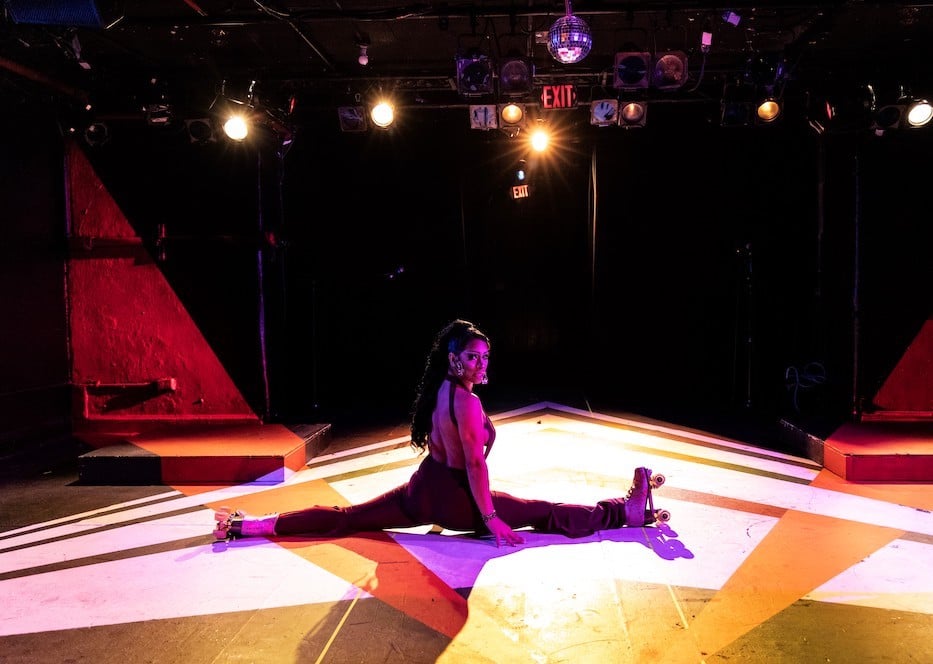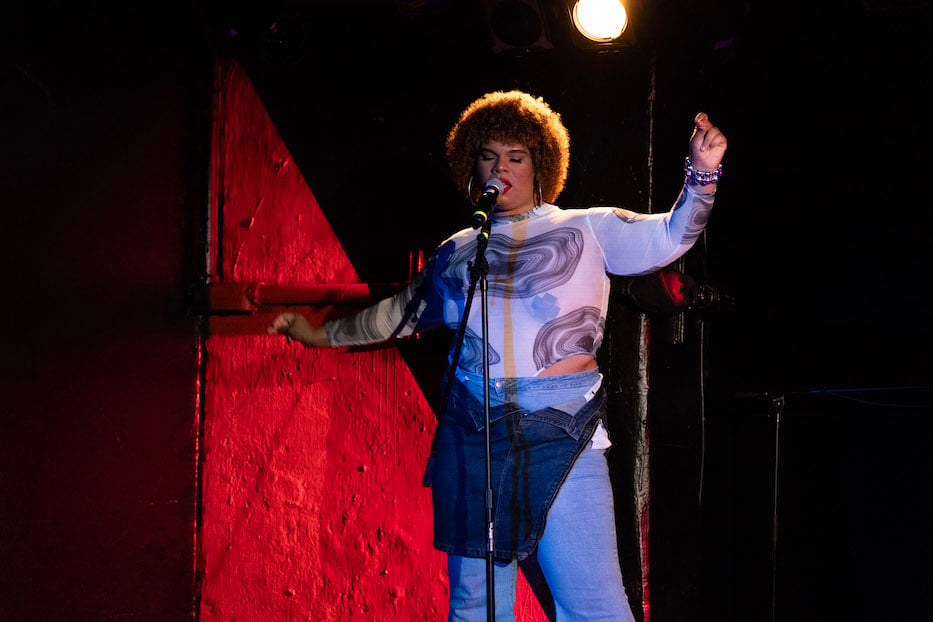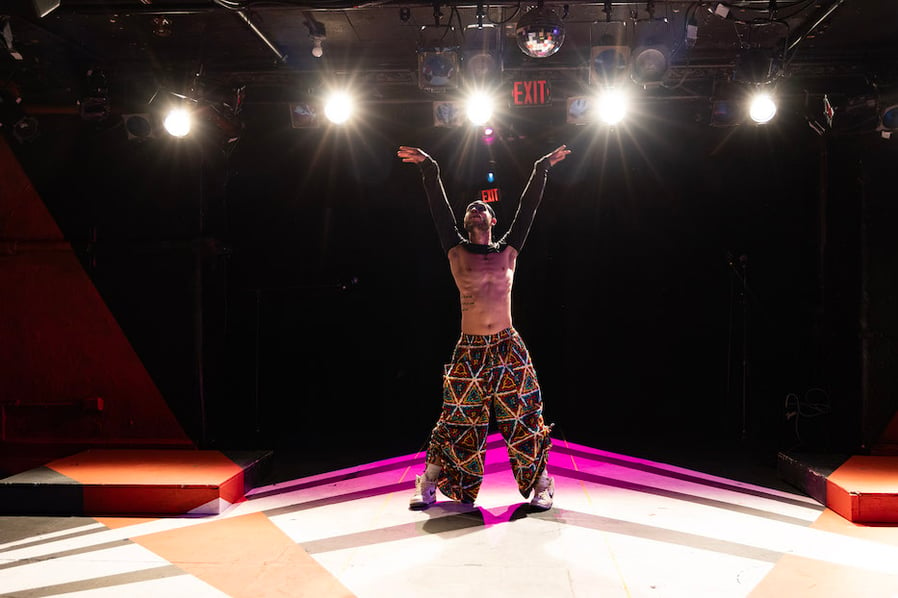
Culture & Community | LGBTQ | Arts & Culture | Yale Summer Cabaret | APNH | Arts & Anti-racism | Pride

Harmony the Valkyrie. Doaa Ouf Photos.
Harmony the Valkyrie was flying, a whir of purple under the soft lights. The lyrics enveloped her—I don't want to/Stay another minute! I don't want you/To say a single word!—and her feet sprouted rollerblades, the wheels whispering against the sprung floor. Overhead, the Pussycat Dolls "Hush Hush" faded into Gloria Gaynor's "I Will Survive," and the spirit of disco flooded the room. Harmony soared across the stage, and dropped into a perfect split.
Cries of "Yaaaass!" rose from the audience. In a week that has seen a queer Black man murdered for publicly experiencing joy, it felt needed, and right on time.
Thursday marked a soaring, triumphant, galvanizing, and gorgeously gay opening of pride365: a cabaret @ the cab, a two-hour variety show and queer odyssey from the Yale Summer Cabaret, New Haven Black Pride and A Place to Nourish Your Health (APNH). Co-hosted by Xiomarie LaBeija and Marlon Alexander Vargas, the performance both showcased Connecticut's breadth of LGBTQ+ talent and tried out a new format in the space, building a more robust bridge between town and gown with performers from both in and outside Yale.
The work, which featured everything from dance and drag to excerpts from a new musical about gay Oedipus Rex, was scheduled to run through August 5 at the Yale Summer Cabaret, 217 Park St. in New Haven, but ended after Friday due to illness among staff and artists. Tickets and more information for the Cab’s next performance are available here.
%20%26%20Xiomarie%20LeBeija%20(Hosts).jpg?width=898&height=599&name=Marlon%20Alexander%20Vargas%20(Left)%20%26%20Xiomarie%20LeBeija%20(Hosts).jpg)
Co-hosts Marlon Alexander Vargas and Xiomarie LaBeija. Doaa Ouf Photos.
At turns heavy, meditative, and explosively joyful, it doubled as a tribute to O'Shae Sibley, a gay Black man who was stabbed for voguing to Beyoncé at a gas station in Brooklyn last Saturday night. Sibley's murder, which is being investigated as a hate crime, has drawn both national outrage and cross-country actions that employ voguing as a timeless act of LGBTQ+ resistance.
Thursday, some artists channeled their rage, grief and exhaustion into their work; others took time on the stage to center joy, hope, and an artistic and cultural history of chosen family and mutual aid.
"Tonight is a promise," said co-host Xiomarie LaBeija, who has been a member of the legendary House of LaBeija for a decade. "Can we make a promise? We promise to give you an amazing show. And you promise to remember these individuals when it's time to vote, when it's time to utilize your voices, when it's time to take action."
And for over two hours in the small black box theater, the pact held. Early in the evening, artist, activist, and poet Erycka Ortiz performed multiple tracks off her new album, Silk Road, the lyrics filling the room until a few members of the audience were swaying along. As she eased into "beautiful ghosts," Ortiz relaxed at the mic, her shoulders, knees, and hips suddenly part of the song. Her voice, smooth as velvet, soaked the small theater, and it became a benediction.

Erycka Ortiz. Doaa Ouf Photos.
It turned out she was just getting started. Bathed in a ruby-red light (a nod to lighting designer Eitan Acks), Ortiz struck a pose at the center of the theater, her silhouette fiery and aglow. When she turned back around toward the audience for "cathedrals are burning," she ran her hands up and down her body, just as if to say I am here. The audience, which moments before had filled the space with cheers and applause, fell to a hush, as not to miss a single word.
It was there, still, when dancer Jan Rosello swept onto the stage to Rihanna's "Lift Me Up," lit in a single, peach-colored beam that bloomed into a field of bright light. Before it did, Rosello began to move methodically beneath the light, as if he could dance away the sheer weight of the world. Rihanna called out and he responded, legs lifting in the air until they seemed heaven-bound. He let himself savor the moment, a stark contrast to an earlier, propulsive number set to Afrobeats and full of motion.
Nowhere, perhaps, was it clearer than in a final act from Dom, Jehloni and Sapphire Bills, all members of the House of LaBeija. Introduced with a booming, dramatic voiceover that nearly gave House Mother Crystal LaBeija a run for her money, the three paid tribute to the culture and living history of ballroom, long relegated to the margins. Thursday, it felt especially powerful, their voguing as much about collective power as it was about kinship.

Dancer Jan Rosello, who is a graduate of Cooperative Arts & Humanities High School. Doaa Ouf Photos.
"This gives us the opportunity to uplift our own community," Xiomarie LaBeija said. When she honors ballroom, she said, she’s telling people “My skin is worth it. My life is worth it.”
And indeed, many of the works also became a call to arms—and to resistance—in a country where LGBTQ+ and particularly trans rights are under constant scrutiny and attack. When they took the stage at the beginning of the night, performer Ryder Die reminded the audience of the sheer artistry and athleticism in drag. By the end of it, their tribute to voguing had the house cheering at a fever pitch, certain to never use the phrase “death drop” again.
Reading from a section of her play The Neo-Vagina Monologues, Yale undergrad Aster Aguilar stepped into character, describing a young trans woman's decision to seek sex work as a way to save money for bottom surgery. As she spoke, Aguilar took the audience into her character’s world, painting an image vivid enough to put a listener in the room with her. She narrated, moving through the motions as if she too could feel the character pulsing somewhere nearby.
In every hotly uncomfortable beat, every nervous and Brechtian “um,” every moment of sexual violence, the audience was left to grapple with a country in which trans people are often seen and treated as less than human. Indeed, baked into the words was a reminder of the hoops, miles of red tape, and underground economies that trans people often have to go through for basic medical care.
When LaBeija walked through the audience in the stunned silence and applause that followed, the pause felt right.
.jpg?width=933&height=622&name=Sapphire%20Bills%20%26%20Dom%20%26%20Jehloni%20(Left%20to%20Right).jpg)
Sapphire Bills & Dom & Jehloni. Doaa Ouf Photos.
For at least an evening—and perhaps the whole weekend—a sense of partnership existed well beyond the theater's walls. Outside the Cab’s intimate black box, representatives of APNH waited at a table with pride flags, literature about the organization, and free, 60-second HIV tests. The last are part of APNH’s push to ensure that New Haveners know their status and can protect themselves and each other with that knowledge.
LaBeija, whose other life is as APNH Safe Space Coordinator Jovanni Cabanas, explained Thursday that the test takes no more than three minutes—one for introductions, one to get acquainted with the test, and a third to take it. Thursday and again on Friday and Saturday, APNH and peer-to-peer support was on standby for those who received a positive diagnosis and needed to know next steps.
It’s part of a larger effort from the Summer Cab’s artistic team to open a door—and offer some of Yale’s vast resources—more widely to the surrounding artistic community. Maya Louise Shed, a co-executive artistic director of the summer season, stressed how excited she is to be collaborating with APNH and New Haven Black Pride. Both are organizations that she hadn’t heard of until a few months ago.
“It feels kind of awesome,” she said. “I’ve only been here [in New Haven] for a year, but the Cab is very dedicated to the Yale community, and specifically DGSD students … but there’s a totally different audience that’s here in the summer, and a totally new group of people that are around, and have spare time, and are artists themselves. So it feels really special.”
“This city and the surrounding areas are living and thriving and having so many beautiful artistic experiences without Yale, and I think that there are a lot of people who either don’t see that or choose not to see that,” she added.
If Thursday's performance is any indication, that door will remain open for the remainder of the summer, and perhaps even into the year. Each Monday and Thursday from 11 a.m. to 1 p.m. the space hosts “Coffee at the Cab,” a free cafe and coworking space for anyone who wants to attend. From August 24 through 26, a festival of new work will feature plays by both Yale-based and New Haven-based playwrights.
The artistic team has also partnered with the Downtown Evening Soup Kitchen for “Serve with the Cab,” through which students, staff, board, and cast members are all invited to pick up volunteer shifts. Adrian Alexander Hernandez, a fellow co-executive artistic director, said that shift has gotten him thinking about New Haven in an entirely different way.
“The School of Drama is so small,” Hernandez said. “Whether it’s 200 or however many people, it’s just so small, and you’re always with the same people. And so, the idea that there are other communities that are not Yale, that I know that I can join and be comfortable in, and create lasting relationships with … wherever I end up later on, after the School of Drama, and know that there are people here that I know is just heartwarming.”
Tickets and more information for upcoming performances at the Yale Cabaret are available here.

